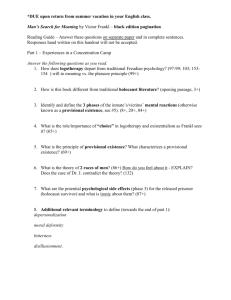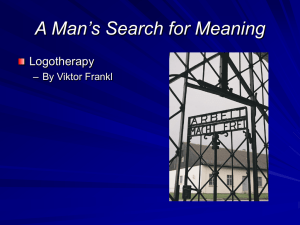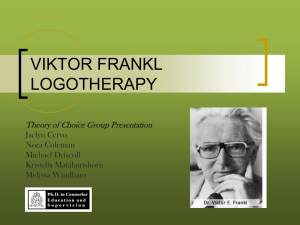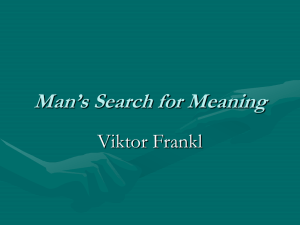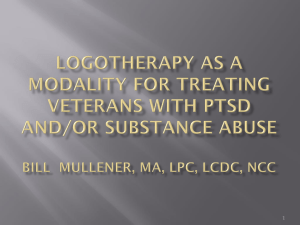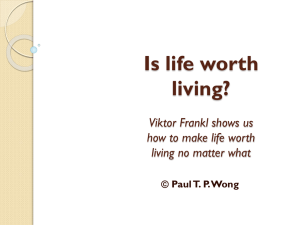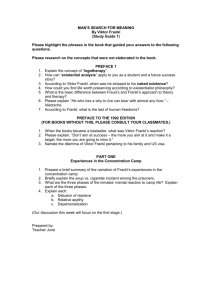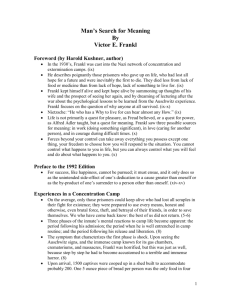Advanced Diploma in Logotherapy – Module 1 Unit 1
advertisement
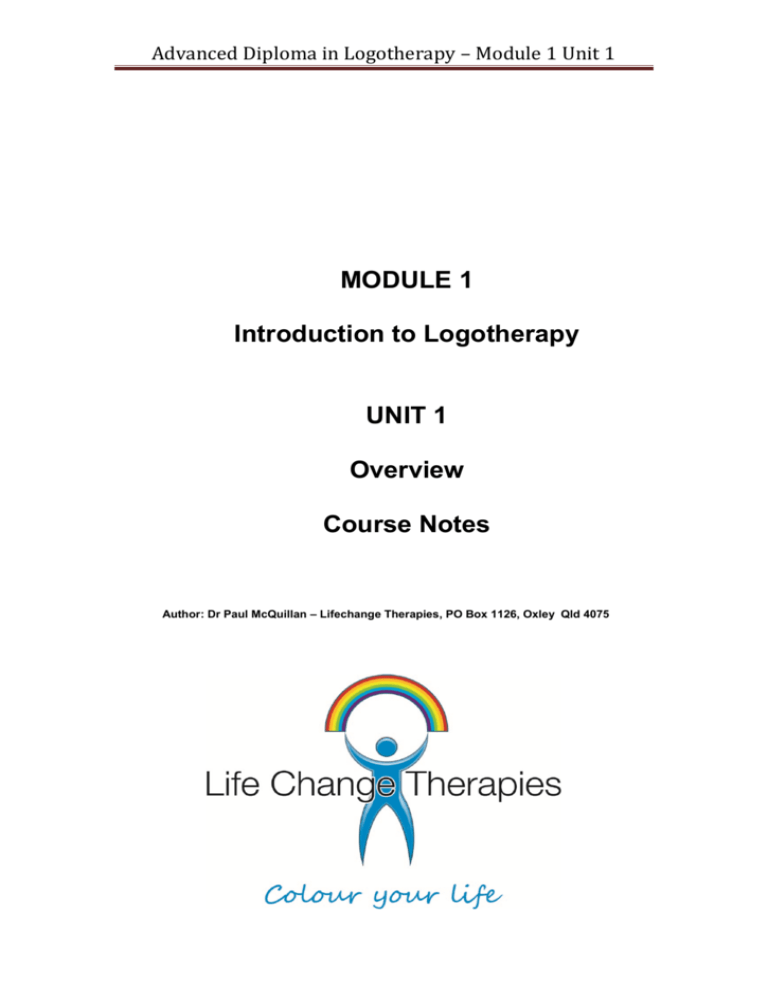
Advanced Diploma in Logotherapy – Module 1 Unit 1 MODULE 1 Introduction to Logotherapy UNIT 1 Overview Course Notes Author: Dr Paul McQuillan – Lifechange Therapies, PO Box 1126, Oxley Qld 4075 Advanced Diploma in Logotherapy – Module 1 Unit 1 Logotherapy – Unit 1 The text for this course is either Frankl, V. (2008). Man’s search for meaning: the classic tribute to hope from the holocaust. Great Britain, Rider, or Frankl, V. (1959/2006). Man’s search for meaning. Boston, MA. Beacon Press. Both are page referenced in these notes and will be referred to as the Rider or Beacon editions. Welcome to Logotherapy. This course will introduce you to the concepts of Viktor Frankl’s psychotherapy, which might well be named “meaning centred” therapy. You will be introduced to the concept that there are three tiers in Logotherapy. First, it is a philosophy of life. Every therapeutic intervention begins by making assumptions about the human being. Logotherapy begins by providing a particular philosophy of life which provides the basis for a theory of psychology and finally a theory of psychotherapy. The skills of logotherapy are not simply applied by the therapist in working with particular clients but are part of the therapist’s personal approach to life. Viktor Frankl invented the term “Logotherapy” himself. In the Greek logos is often translated as “word”. However, its meaning was much deeper than that. For instance John’s gospel ends with the statement “in the beginning was the word (logos) and the Word was with God, and the Word was God”. (John 1:1). There is no suitable and reasonably easy English word to translate the concept. In the Greek logos really referred to concepts rather than being a single word. It referred to concepts such as language, talk, conversation and story; but also to principles such as thought, reason, and even meaning and wisdom. Frankl coined the term “existential analysis” to describe the work he wanted to do with Logotherapy. He did not regard it as a stand-alone therapy. In fact Frankl was a medical doctor and psychiatrist first and foremost. However, he was also convinced that medicine, by working with the body to a large extent and psychology, working and with the mind or psyche was not addressing the full extent of what it means to be a human being. The existential approach is first and foremost philosophical. It is concerned with understanding of the person’s situation in the world and with the clarification of how an individual constructs meaning in his or her life. It focuses on the relation of an individual with their own mortality, their personal identity, their social relationships, their understanding of the natural world and their spirituality – what they in their deepest heart believe to be important. The existential approach regards human nature as open ended, flexible, and capable of an enormous range of experience. In this approach the assumption is that we each have the potential to create our lives with our wide range of free attitudes and behaviours. It is important to understand that existential analysis, another name for Logotherapy, is not intended to be religiously based. Frankl intended it to be a secular therapy. However, it does challenge both therapist and client to think deeply about life and its purpose. What was meant or intended for your life? In what do you find meaning? Before proceeding, take the opportunity to examine you own approach to life. Advanced Diploma in Logotherapy – Module 1 Unit 1 Personal and Group Reflections: Worksheet 1.1.1 Before proceeding, complete Worksheet 1. If you are working with a group, share your responses. If working on-line, send them to your course supervisor by uploading them to the LMS An Introduction to Franklian Psychology Franklian Psychology has been called the Third Viennese School of Psychotherapy. The first such school is psychoanalysis founded by Sigmund Freud, M.D., who around the turn of the century discovered an important human dimension that was a new consideration in the medical world: the human psyche. He discovered that certain physical sicknesses can originate in the psychological dimension, especially in situations where our will to pleasure—particularly sexual pleasure—is repressed into the unconscious where it can cause neuroses, hysteria, and physical illness. The classical case is that of the young woman who suddenly found her legs paralyzed, with no detectable physical cause. The psycho-physiological cause was identified by Freud as conversion hysteria. By probing her unconscious, Freud found that she had been sexually attracted to her sister’s husband; when her sister was critically ill, the woman wished her sister to die so she could have the husband. The sister did die but the woman repressed her wish and became unable to walk until Freud helped her to bring her wish to consciousness. One of Freud’s favorite colleagues was Alfred Adler, who agreed with Freud’s premise that sickness can be caused by psychological repressions. Adler eventually maintained that neuroses and sickness may be caused not only by a repressed will to pleasure but also by a repressed will to power. Just as Freud hypothesized that every child has sexual attractions and hostilities toward the parents, so Adler hypothesized that all children have power struggles with their parents and other adults who play important roles in their childhoods. The repressed will to power may result in inferiority complexes, which can lead to a low self-image or to overcompensation and a “power trip.” To cure such inferiority-caused sickness, Adler developed his own school of psychotherapy, calling it Individual Psychology. This is, of course, a vast oversimplification of Freud’s and Adler’s theories and is intended only to identify one important aspect in the historical development that led from Freud to Adler to Frankl. While Adler was, at one time, a favorite colleague of Freud, Adler ultimately went beyond his mentor. Likewise, Frankl was a favorite student of Adler, and Frankl, too, went beyond his mentor. Frankl hypothesized that not only a repressed will to find pleasure or achieve power can lead to sickness, but so can a repressed will to find meaning. In fact, he placed the will to find meaning at a higher level than the other two. “Pleasure,” Frankl said, “is not an end in itself but only a by-product of having found meaning and having done something meaningful.” And power, too, Frankl insisted, is not an end in itself but only a means to an end, namely to find meaning or to be able to do something that is meaningful. Meaning, in Frankl’s view, is neither a by-product nor Advanced Diploma in Logotherapy – Module 1 Unit 1 a mere means to an end. The human being is basically a meaning-seeking animal— in fact, the only meaning-seeking animal. Frank had the unique opportunity to test his theories when he was committed to the concentration camps of Nazi Germany in World War II. It was this experience that led him to write what has become his best known work, “Man’s search for meaning.” Reading 1.1.1 – The Story of a Bestseller Access reading 1 by Leslie (1990) Remainder of Unit 1 not available Advanced Diploma in Logotherapy – Module 1 Unit 1 MODULE 1 Introduction to Logotherapy UNIT 4 Finding Meaning in Unavoidable Suffering Course Notes Author: Dr Paul McQuillan – Lifechange Therapies, PO Box 1126, Oxley Qld 4075 Advanced Diploma in Logotherapy – Module 1 Unit 1 This section of Unit 4 not available Advanced Diploma in Logotherapy – Module 1 Unit 1 Personal Suffering Through suffering we manifest our values, this is our obligation as humans. A certain tension is healthy according to Frankl, tension between what is and what ought to be. This tension obligates us to strive for higher goals and to look for the “meaning of life”. Change comes as a consequence of what we decide to do when facing irreversible adversities. Change is frequently a consequence of suffering. We cannot pass through life without suffering and changing. Life is constantly forcing us to make choices, reevaluate our values and change. Gordon Allport reminds us that, “In the concentration camp every circumstance conspires to make the prisoner lose his hold. All the familiar goals in life are snatched away. What alone remains is the ‘last of human freedoms’- the ability to ‘choose one’s attitude in a given set of circumstances.’ (Frankl, 1964/1977, p. xi.) It is as if the sufferer can say, “No matter what, I am in control. No one else can dictate to me what I must feel. I have the opportunity to turn my suffering into an achievement.” Frankl says that when an individual is “faced with something unalterable, something imposed by destiny…from the manner in which a person takes these things upon himself, assimilates these difficulties into his own psyche, there flows an incalculable multitude of value-potentialities. This means that human life can be fulfilled not only in creating and enjoying, but also in suffering!” (Frankl, 1955/1986, pp. 121-122). Frankl writes: Thus an impoverished existence - one which is poor in creative and experiential values - still offers a last, and in fact the greatest, opportunity for the realization of values…What is significant is the person’s attitude toward an unalterable fate. The opportunity to realize such attitudinal values is therefore always present whenever a person finds himself confronted by a destiny toward which he can act only by acceptance. The way in which he accepts, the way in which he bears his cross, what courage he manifests in suffering, what dignity he displays in doom and disaster, is the measure of his human fulfillment, (Frankl, 1955/1986, p. 50) Much of our suffering is unnecessary and caused by our own expectations. We expect life to fulfill our hopes. However, it is not ours to ask what life has to offer us, but it is life that asks us to respond to the challenges it poses in order to develop our spiritual muscles or inner strengths. Suffering is Intended to Challenge Us. Suffering corners and questions us. This, Frankl believed, is the very function of human suffering: “Suffering is intended to guard us from apathy, from psychic rigor mortis. In fact, we mature in suffering, grow because of it – it makes us richer and stronger.” Maslow spoke about the psychopathology of the average human being, of his or her fear of human greatness. Choosing to remain in hiding the average man or woman is like an Adam that has come to like a self-complacent lifestyle. Suffering rudely shakes us out of this less than human state by forcing us to look at ourselves and the quality of our own lives. “Suffering established a fruitful, one might say revolutionary, tension Advanced Diploma in Logotherapy – Module 1 Unit 1 in that it makes for emotional awareness of what ought not to be.” (Frankl, The doctor and the soul). (From Shantall (2003), p. 42) Reading 1.4.2. – Text pp. 113-136 (Rider), pp. 108-134 (Beacon). Before proceeding access this reading beginning with the section headed “The meaning of life” and running to the end of “Logotherapy in a nutshell.” Assessment Task 1.4.1 Meanings Before proceeding complete Assessment Task 1. This will ask you to summarise the content of Readings 1.4.1 and 1.4.2 in your own words. When completed upload your assignment to the LMS. If you are doing this course in a group your supervisor will negotiate submission of your assignment with the group. Reading 1.4.3 Finding meaning in Unavoidable suffering. Before proceeding access Dr Robert Barnes article on finding meaning is unavoidable suffering. Video 1.4.1 I broke my neck not me Now access the short video presentation with Gerry Long, whose article you read in Unit 3.
